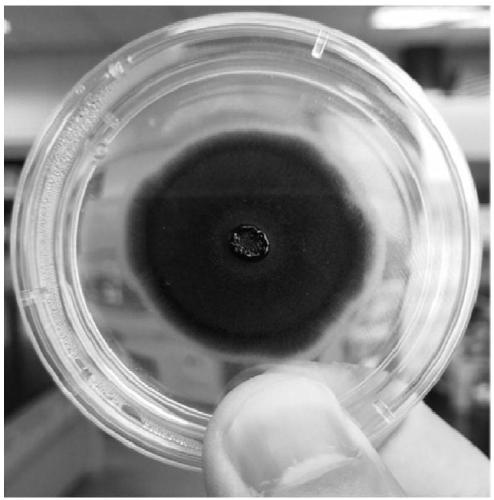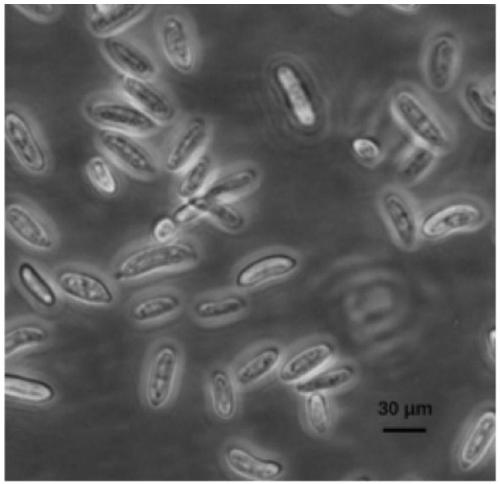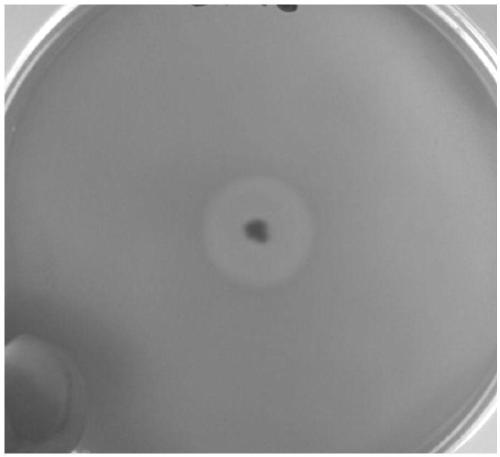Low-temperature straw degradation fungus JGDW-1, microbial agent thereof and application of fungus
A technology of JGDW-1, fungal agent, applied in the field of agricultural resources and environment, can solve the problems of low temperature, slow cellulose degradation, long fermentation cycle, etc., achieve broad application prospects, promote sustainable development, and accelerate straw returning to the field for maturity Effect
- Summary
- Abstract
- Description
- Claims
- Application Information
AI Technical Summary
Problems solved by technology
Method used
Image
Examples
Embodiment 1
[0031] Example 1 Isolation and Identification of Straw Degrading Fungal Strain JGDW-1
[0032] The degrading fungal strain JGDW-1 was screened from a straw accumulation place in Weifang City, Shandong Province. The suspension of the soil samples diluted step by step was applied to the CMC-Congo red plate by the gradient dilution coating method, and cultured at 10°C to screen the cellulose-degrading bacteria. Purify and isolate strains that produce larger transparent circles and grow faster on CMC-Congo red plates, inoculate them on rice straw powder medium with rice straw as the only carbon source, and culture at 10°C to compare the growth rates of each strain and growth conditions, and finally obtained the fungal strain JGDW-1 that can efficiently degrade rice straw under low temperature conditions.
[0033]CMC-Congo red medium: sodium carboxymethylcellulose (CMC-Na) 10.0g, (NH 4 ) 2 SO 4 2.0g, KH 2 PO 4 1.0g, MgSO 4 ·7H 2 O 0.5g, Congo red 0.2g, agar 20g, deionized ...
Embodiment 2
[0039] Example 2 Straw Degrading Bacteria JGDW-1 Inoculum Agent
[0040] Inoculate the strain JGDW-1 into an Erlenmeyer flask containing 50 mL of rice straw powder medium (same as in Example 1), culture it statically at 10°C for 7 days, add 30 mL of sterile water to the Erlenmeyer flask, and shake it on a shaker for 30 minutes , Filter the culture with gauze, which is the spore suspension. The spore suspension was inoculated in a liquid medium with an inoculation amount of 1%, cultured at 170 r / m for 7 days at 10°C, and centrifuged to remove bacteria and impurities to obtain a crude enzyme solution. Among them, liquid medium: rice straw powder 20g, (NH 4 ) 2 SO 4 1.4g, KH 2 PO 4 2g, MgSO 4 ·7H 2 O 0.3g, CaCl 2 2H 2 O 0.4g, Tryptone 1g, FeSO 4 ·7H 2 O0.0075g, MnSO 4 ·H 2 O 0.0025g, ZnSO 4 0.002g, CoCl 2 0.003g, 1000 mL deionized water, natural pH, autoclave at 121℃ for 20min. The rice straw powder is dried rice until the water content is below 1%, crushed, a...
Embodiment 3
[0046] The degradation effect of strain JGDW-1 on rice straw was studied by liquid fermentation in a triangular flask.
[0047] Each 250mL triangular flask is divided into 3.00g of rice straw shredded to a length of 2-3cm and 150mL of liquid culture medium after being pretreated with 2% NaOH solution and dried at 50°C. Inoculate 1.5mL per bottle 10 7 The spore suspension with a concentration of 1 spore / mL was mixed and placed on a constant temperature shaker at 10°C, 20°C, 30°C, 40°C at 170r / m, and the same amount of sterile water was inoculated as a blank control. Regularly observe the morphological changes of rice straw. After 7 days, wash off the bacteria on the straw, dry to constant weight, and measure its degradation rate.
[0048] The results showed that after inoculation at 10 and 20°C for 24 hours, the culture solution began to turn gray-black, and at this time, the rice straw began to soften and disintegrate and disperse. After 48 hours, it has completely turned bl...
PUM
 Login to View More
Login to View More Abstract
Description
Claims
Application Information
 Login to View More
Login to View More - R&D
- Intellectual Property
- Life Sciences
- Materials
- Tech Scout
- Unparalleled Data Quality
- Higher Quality Content
- 60% Fewer Hallucinations
Browse by: Latest US Patents, China's latest patents, Technical Efficacy Thesaurus, Application Domain, Technology Topic, Popular Technical Reports.
© 2025 PatSnap. All rights reserved.Legal|Privacy policy|Modern Slavery Act Transparency Statement|Sitemap|About US| Contact US: help@patsnap.com



